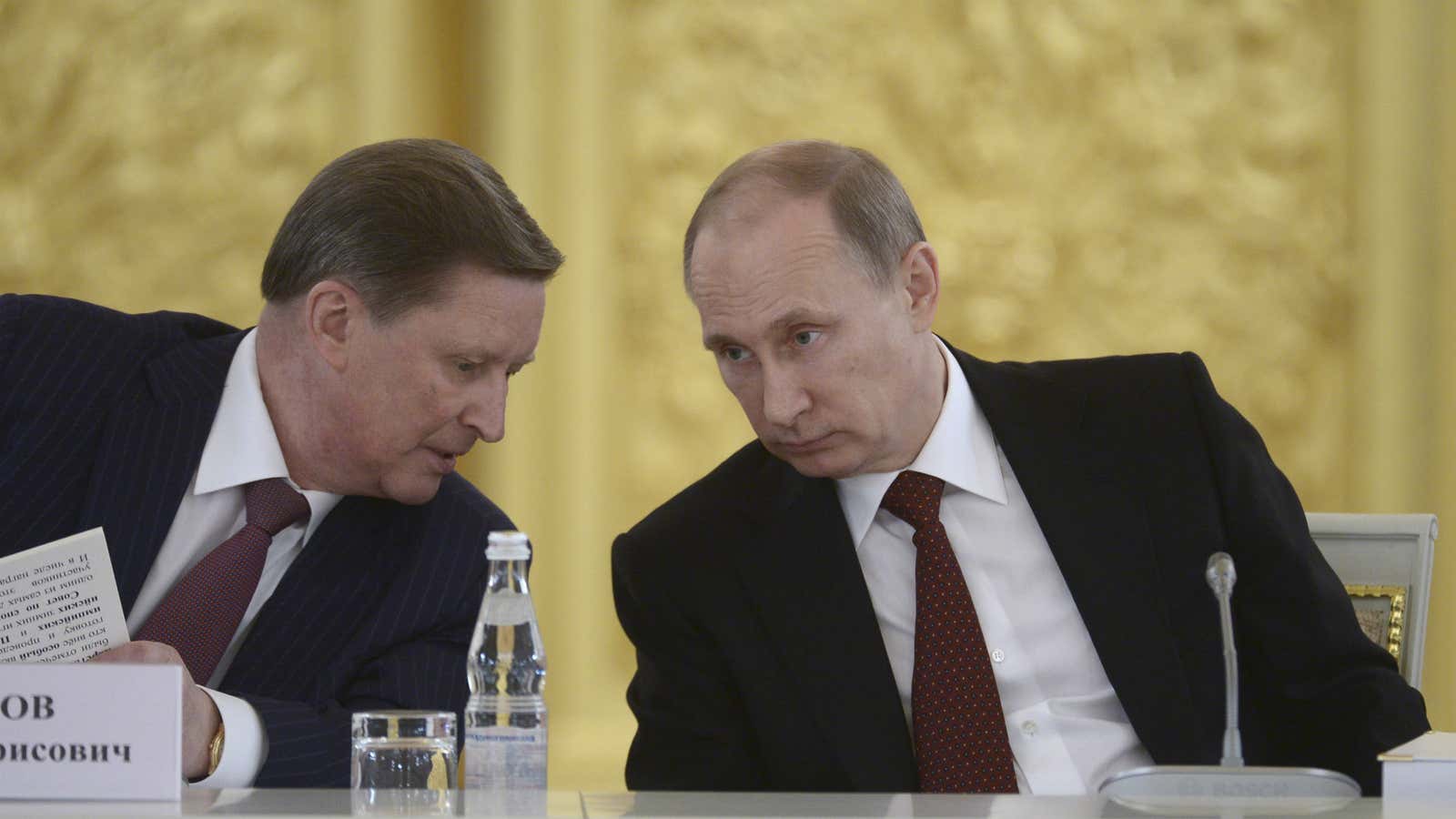Billionaire hedge fund manager George Soros has come down on the side of using US oil to tame Russian president Vladimir Putin. But a senior member of the Saudi Arabian royal family—which has more experience than anyone on the planet in using oil as a geopolitical weapon—doubts it would work.
The strategy under discussion, which Quartz has written about before, is to drive down the price of global oil. If it could be done, a price in the $90-a-barrel range (Brent crude was trading around $106.60 at the time of writing) would be a big hit to the Russian state budget, half of which is sustained by oil and oil-indexed gas exports. Oil and gas make up some 70% of total Russian exports.
The instrument is the 700-million-barrel US Strategic Petroleum Reserve (SPR). The idea is for the US to sell sustained volumes of 500,000 to 750,000 barrels a day from the SPR into the market. Since oil prices are determined on the margin—that is, by fluctuations within the 2-3 million barrels of surplus volume or production capacity around the world—that could be sufficient to puncture prices.
An oily stick to beat Russia with
The universal principle being invoked is the “First Law of Petropolitics,” coined by New York Times columnist Tom Friedman. The law states that when oil prices are high, the leaders of petro-states can become demanding and belligerent; when they are low, they are more prone to be pussycats.
The idea has gathered steam since, a little over a week ago, the Obama administration sold 5 million barrels of oil from the SPR. The administration said the sale was unrelated to Russia’s takeover of Crimea, but intended or not, it was widely interpreted as a shot over Moscow’s bow—a warning that, if it wants, the US can lead a charge to strike the Russian economy.
Soros today emphasized the power latent in the SPR. “The strongest deterrent [to Putin] is in the hands of the United States because it can release oil from the strategic oil reserve, which would then reduce the price of oil and that would ruin the Russian economy, which lives on oil,” he told American Public Media.
Many analysts are skeptical of the idea. Some call the oil weapon “silly.” For one thing, Russia could itself cut back on its 7-million-barrel-a-day regime of oil exports and wait out the US.
However, the Russian economy and budget are heavily reliant on oil. Russia could cut back production and wait, but it would suffer, while the US would absorb no impact at all. It is a real question who would be pressed to buckle first.
The Saudi calculus
A more compelling skeptical argument is that the biggest game in global oil—Saudi Arabia—might not cooperate with such a scheme. President Barack Obama will visit Saudi King Abdullah tomorrow in Riyadh. No one has said that the oil weapon is on his agenda. But Prince Turki bin al-Faisal, one of the most senior members of the royal family, says he, too, is dubious.
Speaking last evening before a small group of students at Georgetown University, Turki did not remark specifically about the SPR scheme. But he said that the oil world is different from 1973, when Saudi Arabia led an OPEC boycott that sent the world’s consumer economies, especially the United States, into a panic and established the kingdom as a power not to be trifled with.
Today, Turki said, there are many different sources of oil, and many more moving parts in the industry, making it far more difficult to mount such an offensive. “I am skeptical whether there can be something called an energy weapon to be used these days,” Turki said. “The oil market today, if Saudi Arabia were to place an embargo—it would not succeed. The market is too big for one country to affect what‘s on the market.”
Yet what if King Abdullah did decide to cooperate? What if not one but two key countries, the US and Saudi Arabia, conspired? What if Abdullah agreed to hold Saudi oil production at its current 9.7 million barrels a day, or even pumped a bit more—say 10 million? Combined with an SPR release, such a surplus would be difficult for Putin to combat.
The Syria factor
For Obama, this would be a hard concession to win from the Saudis. King Abdullah is non-plussed with the US president, to say the least; Turki himself has been an outspoken critic of US policy. The Saudis still regard the US as their main global ally, but Abdullah wants to know why Obama has acted so contrary to the interests of his main Gulf ally—why is he fraternizing with Iran, Saudi’s mortal enemy; backing a distasteful Iraqi prime minister who is allied with Tehran; and failing to stand up to the Syrian regime?
But there would be an arguable upside for the king. Driving out Syrian leader Bashar al-Assad is a top Saudi aim, and a more contrite Putin might be less supportive of the dictator. A student of history, Putin is no doubt aware of the main reason for the collapse of the Soviet Union: an unrelated decision by Saudi Arabia to flood the global market with oil, which drove down the price to $13 a barrel. Even if he doubts the US’s resolve, he might be wary of running the risk.




